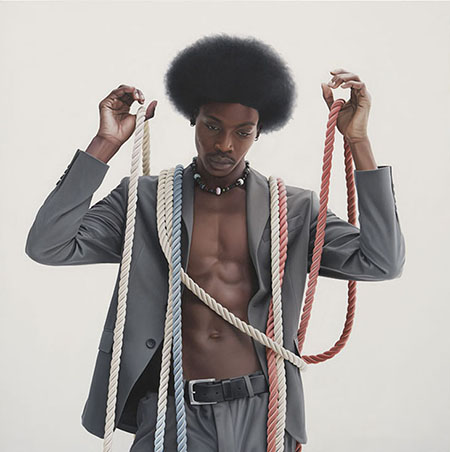
Continuing through June 16, 2023
Delfin Finley unveils a sparse but powerful collection of new paintings, five in all, which bring a fresh perspective to an ongoing conversation maintained previously by older African American artists such as the late Barkley L. Hendricks and the ubiquitous Kehinde Wiley. These artists have been celebrating people of color by making sympathetic and at times idealized portraits of them that debunk prejudicial stereotypes. As a Black man who readily acknowledges that violence due to racism is engrained as part of his heritage, Finley sought to create a body of work that portrays his subjects as strong and empowered, but bearing the weight of the past and ever cognizant of the threats of the present.
To achieve this, he introduced a prop into his portraits that provides the series with both metaphorical and compositional potency and continuity. In each of Finley’s compositions, the subject is shown wearing or interacting with an arrangement of red, white, and blue ropes, symbolic references to the U.S. histories of slavery and lynching, as well as to the seemingly perpetual incidents of senseless shootings of black Americans. Perhaps to distance their protagonists from being associated with overzealous flag-obsessed “patriots” such as the January 6 insurrectionists, and also to refer to a better future, the colors employed by Finley are actually pink, white, and pastel blue, which makes for a softer palette than that of the American flag, and thus suggests a non-violent tone, and an enlightened kind of freedom based on love and respect rather than on hatred and conflict.
In terms of process and style, Finley poses and photographs his subjects before skillfully depicting them in a near-Photorealist style. In the finished paintings, the figures possess a weighty physicality that is achieved in part by setting them against barren white backgrounds that pushes them forward into the viewers’ space. In the works where they are just slightly larger than life size, we feel their presence in the room. This is especially evident in “Oak” and “Regalia,” where the figures make eye contact with us, and in “2 Up, 2 Down,” where the subject tilts his head forward.
Finley began his career as a graffiti artist, and urban coding is at play in the latter title, which refers to signing the letters ‘V’ (two fingers up) and ‘A’ (two fingers down), and is slang for the state of Virginia, the native home of the painting’s subject. Additionally, Finley told me in a brief conversation that he also sees these hand gestures as relating to the Chinese principle of the yin and the yang, which has traditionally been applied to distinctions between masculine (yang) and feminine (yin). The artist was likely guided by this idea in the way he has contrasted the male and female portraits. While the men are shown in active poses, entangled in or interacting with the ropes, the women stand in graceful repose, with ropes streaming down their bodies like the elegant drapery folds of ancient Greek caryatids.
Although the symbolic ropes are the dominant threads that unify the series, each portrait is individually intriguing through its particular narrative overtones. Finley views the male figure in “Oak” as both a puppet and a puppeteer. Rather than shown as manipulated, the figure controls the ropes and is thus the manipulator. The irony here is another example of the artist toying with the yin/yang concept. More importantly, the title reminds us of the oak trees upon which so many Black and Brown people were lynched, a subject that was earlier explored in haunting photographs by Ken Gonzales-Day.
Another common characteristic of Finley’s portraits is that the figures wear stylish clothing, a reflection of the fact that the artist is the son of fashion designers. In “Oak,” the male subject wears a sporty suit and necklace, yet his jacket is open to reveal his bare and well-defined musculature, suggesting that he is a present-day Hercules. In “Mantellum,” the sole small-scale painting in the exhibition, the title refers to the cloak-like arrangement of ropes that adorn the woman’s back. Although she remains anonymous, as she is seen from behind, we know that the subject is a refined woman of taste, as indicated by her neatly coiffed hair, elegant dress, and one visible earring. In short, this little gem of a painting comes across as a contemporary rethinking of Vermeer’s “Girl with a Pearl Earring.”
By contrast, the woman portrayed in “Regalia,” the show’s tallest work, wears denim work clothes and white sneakers with red and blue stripes, which extends the theme of the series to her attire while symbolically asserting her American identity. Her ropes, on the other hand, simulate the folds of a high-end evening gown, thereby assigning her the “royal” status of a red carpet celebrity.
In confronting the topic of racist lynching with thoughtful, symbolic visual poetry, Finley joins not only Gonzales-Day, but a growing number of contemporary artists who process the severity of the White Supremacy Movement’s legacy in this way. In that regard, ropes have assumed a similar role in works by Hank Willis Thomas, who has portrayed Black basketball players aiming their ball at a noose, and Vincent Valdez, who used real rope when posing Latinx friends in lynching positions and then painted them with the rope removed in the finished image.
